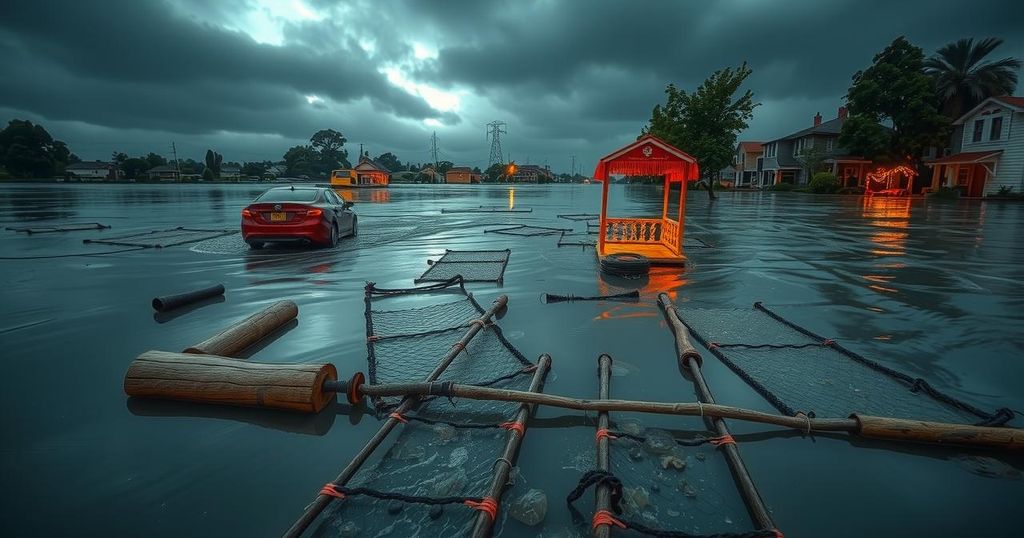A study reveals that human-caused climate change has aggravated flooding in Africa, particularly in Sudan and surrounding nations, resulting in hundreds of deaths and millions displaced. The research indicates that fossil fuel warming has intensified this year’s rainfall by 5 to 20 percent. Urgent calls for action to transition away from fossil fuels and support climate-affected regions highlight the pressing need for intervention as extreme weather becomes increasingly commonplace.
A recent study reveals that human-induced climate change has intensified flooding across several African nations, including Cameroon, Chad, Niger, Nigeria, and Sudan. This year alone, these floods have led to hundreds of fatalities and displaced millions, contributing to a severe humanitarian crisis in the Sahel region, which borders the Sahara Desert. The World Weather Attribution (WWA) network of scientists conducted an analysis indicating that fossil fuel-driven warming has exacerbated the extreme weather conditions in Sudan. The researchers found that the torrential rains experienced this year were 5 to 20 percent more intense than they would have been without human-induced climate change. Clair Barnes from the Center for Environmental Policy at Imperial College London highlighted the seriousness of the situation, warning that if fossil fuel consumption continues, such torrential downpours could become an annual occurrence as global temperatures rise to two degrees Celsius above pre-industrial levels. The study underscores that climate change affects not only rising temperatures but also results in more intense storms and downpours. In war-torn Sudan, where displacement is rampant due to ongoing conflict, many are forced into flood-prone areas, heightening the impacts of such weather events. The scientists utilized modeling to assess weather patterns, concluding that extreme rainfall events in Sudan have become heavier and more frequent as a direct consequence of climate change. At the current level of 1.3 degrees Celsius of warming, they project that similar rainfall occurrences are expected approximately every three years, with a 10 percent increase in intensity attributable to climate change. Izidine Pinto, a researcher at the Royal Netherlands Meteorological Institute, expressed significant concern regarding these findings, stating that each increment of warming adds to the risk of extreme flooding. He emphasized the imperative for the upcoming UN COP29 climate summit to catalyze a transition away from fossil fuel reliance. Furthermore, Joyce Kimutai from Imperial’s Center for Environmental Policy advocated for a loss and damage fund to support nations adversely affected by climate change. Despite Africa contributing minimally to global carbon emissions, it bears the brunt of severe weather abnormalities. The researchers further emphasized that effective management of dams and establishment of early warning systems are crucial in mitigating the impacts of climate-driven floods.
This article focuses on the profound impact of climate change on flooding in various African countries, specifically highlighting the exacerbation of humanitarian crises within the Sahel region caused by intensified rainfall due to anthropogenic climate change. The research conducted by the WWA aims to quantify the influence of human activity on extreme weather events, revealing a troubling trend of increasing severity and frequency of floods linked to global warming. The findings underscore the urgent necessity for global action to reduce fossil fuel consumption and enhance climate resilience in vulnerable regions.
The study indicates that climate change has significantly worsened flooding crises in parts of Africa, leading to substantial loss of life and extensive displacement. With climate change expected to exacerbate future weather patterns further, the research calls for urgent measures to reduce fossil fuel use and implement adaptive strategies, such as improved early warning systems and infrastructure upgrades. As Africa faces the harsh consequences of climate change, there is an urgent need for international support and funding to address these challenges and bolster resilience.
Original Source: phys.org







